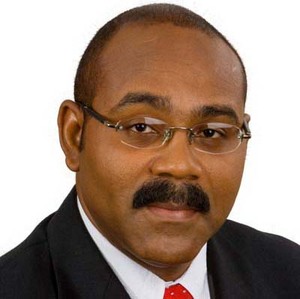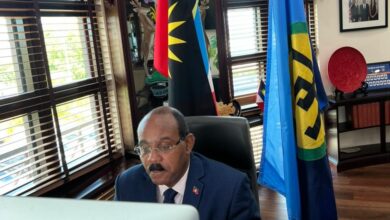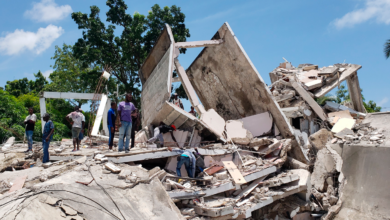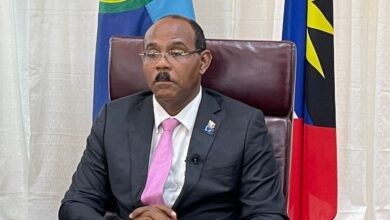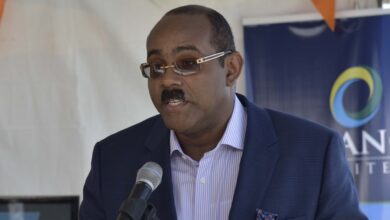I thank Prime Minister Perry Christie and the people and government of The Bahamas for the warm welcome given to all the participants in this meeting.
We have no doubt that under Prime Minister Christie’s chairmanship, the outcomes of this meeting will be beneficial to the people of the Caribbean Community who have entrusted us with a mandate to manage their regional affairs.
As I formally hand-over the gavel of chairmanship of CARICOM, I would like to reflect briefly on the period of my own stewardship of the Community’s affairs.
I came to the Chairmanship within weeks of winning a general election and becoming a Head of Government for the first time.
I am thankful to my colleagues for the encouragement and support they gave me.
And, I was extremely pleased that I was able to superintend our Community affairs through some historic events.
Those events include the decision of the Governments of Cuba and the United States to establish diplomatic relations.
We in the Caribbean can rightly take credit for being on the right side of history in this matter dating back to 1972, when four independent member states of our Community ended the US-inspired hemispheric diplomatic embargo of Cuba.
At our Summit meeting with Cuba last December, I called on the US congress to end its senseless trade embargo against Cuba.
I do so again now.
I also had the privilege of chairing our grouping in a meeting with Japanese Prime Minister, Shinzo Abe in Trinidad. In addition, I was extended the privilege to speak on behalf of Caricom as a whole during a Celac meeting in Brazil, when the majority of our member states had a productive meeting with China’s President Xi, that has set the foundation for a beneficial economic relationship between us.
At the third Summit of the Community of Latin American and Caribbean States (CELAC), in Costa Rica, I was pleased to speak on behalf of CARICOM.
That Summit agreed on a plan of action to eliminate hunger by 2025 submitted by the Director-General of the Food and Agriculture Organisation, Dr. José Graziano da Silva, who is with us at this meeting and with whom we can follow-up specific measures of benefit to the people of the Caribbean.
You will note Chairman that I speak of “the people” of the Caribbean, and not “the peoples” of the Caribbean.
I do not regard the inhabitants of our Region as different “peoples”; we are one people with a shared history, common challenges, common opportunities and a common destiny.
Those challenges cannot be effectively overcome nor can the opportunities be successfully seized by each of our countries acting alone.
While each of our small nations from time to time may enjoy a moment of remarkable triumph, we all know that such moments are rare and are – in any event – temporary.
They are not enough to sustain our economic growth domestically, nor are they sufficient to protect us from the onslaught of powers much bigger and stronger than any of us.
Only our collective action in defence of our mutual interest will offer resistance to the tides of unfavourable challenges that rush from outside and imperil the livelihoods of our people.
Similarly, only united action will allow us to take advantage of opportunities that could better the lives of our people.
We need collaboration, cooperation and unity within our Region and in our Region’s affairs with the international community, if we are to surmount obstacles, overcome limitations and advance our people’s interests.
We need to engage the international community at all the levels open to us, and through our best people.
Wherever possible we must establish a Caribbean presence within international organisations to advance Caribbean interests.
And, we must do so through genuine Caribbean representatives who have fought in the trenches for us and for Caribbean development.
That is the only way we have a chance of success.
Mr Chairman, our Region now confronts one of the most demanding periods of its post-Colonial history.
Even though we are small and vulnerable, the international community treats us as if we enjoy the resources, the populations, the land mass and the wealth of the United States or the European Union.
The special and differential treatment to which our small size, high transactional costs, and openness of our markets should have entitled us, is denied us.
In this regard, I take this opportunity to thank the people and Government of Venezuela for the special arrangements rendered to many CARICOM countries under Petro Caribe.
I also thank the Governments of China and Taiwan for their support as well.
While others were neglectful of the adverse impact on our economies of the financial crisis that originated in the US and Europe, the governments of Venezuela, The People’s Republic of China and Taiwan extended a hand of help.
We will not forget.
Chairman, I call on this Conference to register our condemnation of the recent report of a plot to overthrow the constitutionally elected government of Venezuela.
In our region we believe in the democratic process as amply demonstrated by all our recent general elections that changed governments by ballots not bullets.
Let us send that message of firm commitment to the democratic process resoundingly around the world.
Mr Chairman, while my own country is not affected, we are deeply disturbed by the news that from the end of next year, European Union policy will deal a severe blow to Caribbean sugar producing nations, such as Barbados, Belize, the Dominican Republic, Guyana and Jamaica.
The EU will terminate a cap on European beet sugar production and so flood the EU market displacing sugar exports from Caribbean countries that will be unable to compete with heavy subsidies given to EU beet sugar producers.
The British Department for International Development is reported to have predicted that this “perfect storm” of the new EU beet sugar policy, and the consequent low, subsidised price, will force force 6.4 million people in African, Caribbean and Pacific countries into poverty over the next five years.
Caribbean sugar workers will be forced into subsistence agriculture and will face the danger of extreme poverty.
The EU does not appear to have any appreciation for the fact that we cannot create new markets in the space of a year, nor can we retrain and retool our farmers in other crops.
They have also repeatedly, broken their commitment to us on sugar – a commitment for which our representatives fought since 1973.
We are proud to have with us at this meeting our first spokesman on sugar when that commitment was negotiated – the Most Honourable PJ Patterson, a Caribbean patriot and statesman to the core.
I am sure that he would agree that this latest grave and mortal policy announcement by the EU is not one that we should allow to rest.
This Conference should and must resolve, that this issue will be taken up aggressively with the EU at the highest levels – and taken up by all our governments collectively.
Mr Chairman, the countries of our Community are not only marginalised in the international community with no voice or vote in International Financial Institutions of the world, we are also coerced into adopting policies that harm our own economies while serving the interests of others.
Extra-territorial laws and policies made in other countries and regions are imposed upon us without consultation – indeed without the slightest interest in such consultations.
We are made to implement the agenda of others, even to the point of spending our own scare resources to act as their tax collectors, or we suffer the consequences of not surrendering to their will.
Now our banking sector is facing a new and potentially devastating threat.
Our Region is being labelled as a high-risk area for financial services.
Consequently, correspondent banks in the United States and major banking centres in Europe are being made to evaluate risks versus rewards for doing business with our indigenous banks, and banks in our offshore sector.
Because in many cases indigenous banks cannot provide a high level of reward, correspondent banks are closing their relationships with them – all because an arbitrary an unsubstantiated claim is being made that the Caribbean is a high risk area for financial services.
Unless this situation is addressed with urgency, the indigenous banks in each of our countries will be forced to close their doors, not because of any inherent difficulties in the banks themselves, but because they are constrained from transacting business abroad.
I need hardly say that the impact of such a development on our economies would be calamitous.
Mr Chairman, I venture to suggest that our Community should waste no time in jointly addressing this problem.
I call on this Conference to agree to establish a Committee of Finance Ministers to work with the Caribbean Association of Banks to develop a plan to deal with this matter, including by making strong representations at the World Bank, the IMF, within the Commonwealth and La Francophonie and, if it necessary, at the United Nations.
It is time that we raise our voices and not meekly accept the continuing emasculation of our financial services, particularly after we have spent millions of dollars on making our jurisdictions compliant with every demand that has been made of us.
The situation is unfair and unjust.
Colleagues, the state of financial services, which once contributed significantly to the growth and development of our economies, is now a shadow of its former self.
Yet, despite all that we have lost through the dictates of powerful countries, our countries receive no concessionary funding from International or Hemispheric international institutions or from countries whose policies materially affect our economic and social development.
And, while that observation is valid for all our countries, in the specific case of Antigua and Barbuda, in two weeks’ time it will be eleven long years since the World Trade Organisation granted us an award which has not been honoured by the country that violated an international agreement and injured our economy.
My country is yet to receive the benefit of that award, the penalties for which, according to the WTO ruling, now stand in the equivalent sum of US$168 million.
It is not, Mr Chairman, that representatives of my country have not sought consultations with the other party to settle this matter.
We have been patient and we have been reasonable, but so far to no avail.
The casualness with which the ruling of the legitimate international body has been treated, and the neglect of a legally-binding obligation have implications for every country represented in this room.
I signal now that there are remedies legally available to my government that have been stipulated by the WTO.
We hope that we are not forced to resort to these remedies, but we have a duty of care to our people that we cannot disregard.
Mr Chairman, we in Antigua and Barbuda, are thankful to our brothers and sisters in the Caribbean Community for all their moral support and their many declarations of solidarity.
It is my fervent hope that you, as representatives of the Caribbean people, will at this meeting once again strongly indicate your support of Antigua and Barbuda.
Mr Chairman, I know well the daunting task that faces each of our governments to provide employment for our people, to attract investment, to fight crime, to eliminate guns from our streets, to keep our people safe while we improve health care and education; and build roads and ports.
I know it is right that we should formulate national policies to meet all of these challenges and that we should each do so creatively, but I warn that none of us should believe that we can succeed on our own.
Within the Region, our policies need to be mindful of the need to spread the face of integration so that all our people reap some benefit.
My own country has been a faithful member of regional organisations since we helped to found CARIFTA in 1965 and throughout the trials and tribulations of CARICOM.
For all these years, we have endured serious balance of trade deficits with virtually every CARICOM country.
We have been a ready market for the goods of our sister-states.
It is in that connection, that we believe that countries, such as Antigua and Barbuda, that have stayed the course without benefits in trade, should not also be disadvantaged in services like LIAT to which we have also been a major financial contributor over several decades for the benefit of many other countries.
We must ensure that regional integration serves the interest of all.
In this regard, I welcome the initiative of the Prime Minister of Trinidad and Tobago, Mrs Kamla Persad-Bissessar, for our region to consider the growing threat to our security posed by international terrorism.
Before us are recommendations from the Commissioners of Police and Heads of Intelligence of CARICOM arising from the Prime Minister’s initiative.
These recommendations encompass collective regional safeguards against terrorism, and they include measures to curb illegal guns and gangs – phenomena that plague all our countries, terrorising our people and damaging our economies.
Despite the fiscal constraints with which all our governments are faced, I hope that we can adopt the very pro-active recommendations of the Commissioners of Police and Heads of Intelligence.
The work they have done is a fine example of the region’s brains working together for the benefit of the region and for our people.
We should applaud their effort and their example.
Colleagues, I know doubts continue to exist about the effectiveness and usefulness of our regional integration movement. However, Antigua & Barbuda remains fully and firmly committed to Caricom Integration.
But, as I formally hand over the Chairmanship of CARICOM to the Prime Minister of the Bahamas, Perry Christie, I do so convinced that regional integration remains vital to the betterment of our countries individually and collectively.
The evidence is clear: we need more not less regionalism; we need more not less regional integration.
Thank you very much.

